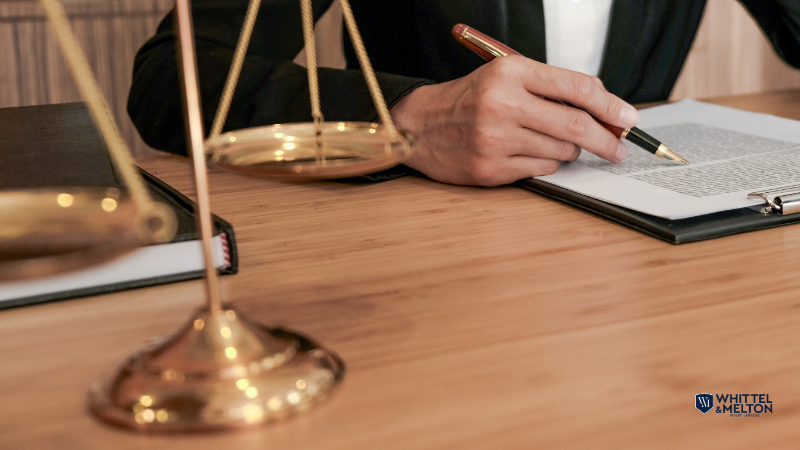- Contact Us Now: 1-866-608-5LAW Tap Here to Call Us
What Happens if My Personal Injury Case Goes to Trial?

Whether a case involves a slip and fall accident at a grocery store or a car accident, most personal injury claims can be settled outside of the courtroom.
The court system generally prefers that parties settle their cases outside of the courtroom, as this helps keep the court’s schedule clear for more significant matters. However, if negotiations fail, parties can file a lawsuit, and a judge or jury will then make a decision. There are several instances where a trial may be necessary, including:
- Fault is up for debate: Sometimes, the individual who has brought harm to you denies any responsibility. They may argue that the injury was your fault or someone else’s. Determining who is at fault is crucial since that person is financially responsible for the damages.
- Discrepancies involving the dollar amount of damages: The at-fault party may admit to negligence and owe you money yet refuse to pay what your attorney demands. You may want to pursue a lawsuit if the monetary damages you seek exceed $100,000.
- Causation is disputed: Insurance firms frequently acknowledge fault while citing different reasons for the pain you are experiencing. They may claim that you do not deserve any monetary damages because of your age, previous injuries, or other medical issues.
When parties decide to take a case to trial, they face inherent risks associated with that choice, regardless of the reasons behind it. A judge or jury could rule in favor of the other side, which means you could walk away with nothing. That said, it is best to discuss this with your personal injury lawyer and get their thoughts on your case. You can ask them about cases they have taken to trial that were like yours and what the outcomes were. At Whittel & Melton, our Florida injury lawyers take on personal injury cases and work on a contingency fee basis. This means we only get paid if we successfully recover financial compensation for you.. If we decide to take your case to trial, then we are confident that we can achieve a favorable verdict.
What Happens During the Pre-Trial Phase?
Your attorney will file a complaint and summons, sending them to the defendant, whom you believe is at fault. A complaint details what happened and what your injuries are and identifies who you are seeking compensation from. The summons informs the defendant that someone is suing them. Once both documents are received, the defendant must respond with an answer.
From there, the pre-trial phase continues with the discovery process. Both parties can obtain important case information through discovery. This is one advantage of bringing a lawsuit: your attorney may obtain crucial material that was previously unavailable to resolve your case. Discovery may include physical examinations, depositions (interviews conducted under oath), and other record demands.
The parties involved typically engage in negotiations during the pre-trial phase, which lasts about a year, making it possible to reach a settlement. Your attorney can best advise you on whether a settlement offer is in your best interests or not, so that you can make an informed decision.
What Happens if My Case Proceeds to Trial?
If you cannot reach a settlement, the court will proceed to trial with your case. Most personal injury cases last a few days to a few weeks, with a few exceptions. Here is a breakdown of what happens in the courtroom:
- Opening Statements: Each party will have an opportunity to outline the fundamental facts of what occurred and what they seek to show throughout the trial. This is an important step as it is your attorney’s first impression on the jury about the circumstances surrounding your case.
- Witness Testimony and Cross-Examination: Both sides will have the opportunity to have witnesses take the stand and answer questions that help to tell their version of events. The other parties involved will be able to cross-examine these witnesses. You may need to testify, and your attorney will prepare you for this and help you handle questions from the opposing side.
- Closing Argument: This is the last stage of the trial process, during which each side makes one final argument summarizing its position.
- Jury Deliberations: The judge will provide instructions to the jury, and then the jury will deliberate and decide if they favor you (the plaintiff) or the other side (the defendant). If they find in favor of the defendant, then you will not receive any financial award. If they support you, they will determine how much money the defendant owes you. A jury may find that the plaintiff shares some responsibility for their injuries and assign a percentage of fault, which the court will use to reduce the awarded amount.
How Can I Help My Injury Case?
As a plaintiff, there are several things you can do to help your case proceed without a hitch. You should always be open and honest with your attorney about your case and injuries. Being dishonest with your lawyer will only hurt your case. Always follow your doctor’s instructions, as not doing so could allow the defense to argue that your injuries are not as severe as you claim. Lastly, you should not post about your case or injuries on social media. If you post something, it could be used against you in court.
Call Whittel & Melton for a Free Consultation
There is no fee to meet with our Florida Injury Lawyers about your potential personal injury lawsuit. We welcome you to call us at 866-608-5529 or contact us online. We have decades of combined experience as trial lawyers, so we know what it takes to win these cases.
















